Unit 2 Witnessing time Reading(1):The Acropolis now 课件(27张)
文档属性
| 名称 | Unit 2 Witnessing time Reading(1):The Acropolis now 课件(27张) |
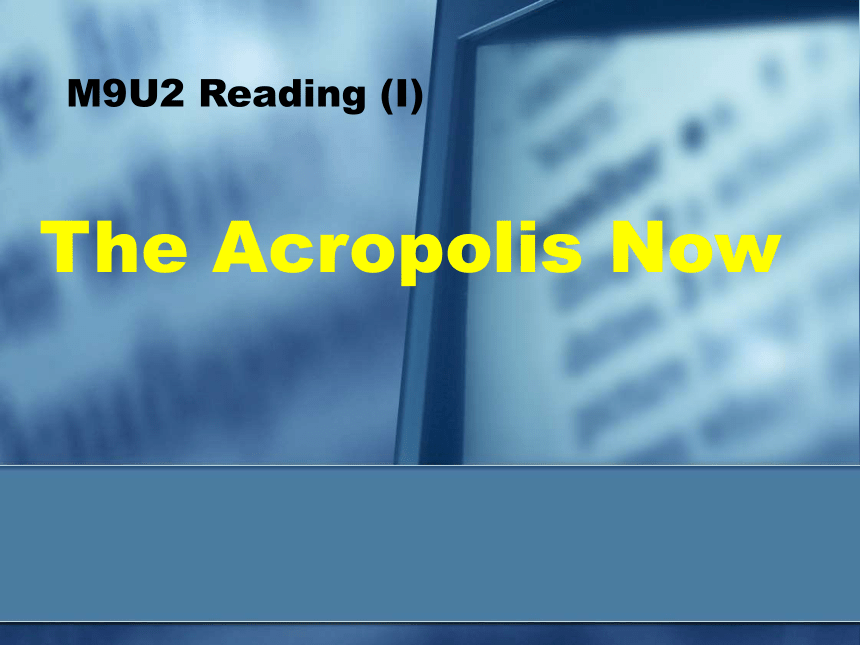
|
|
| 格式 | zip | ||
| 文件大小 | 1.0MB | ||
| 资源类型 | 教案 | ||
| 版本资源 | 牛津译林版 | ||
| 科目 | 英语 | ||
| 更新时间 | 2019-08-03 18:01:49 | ||
图片预览

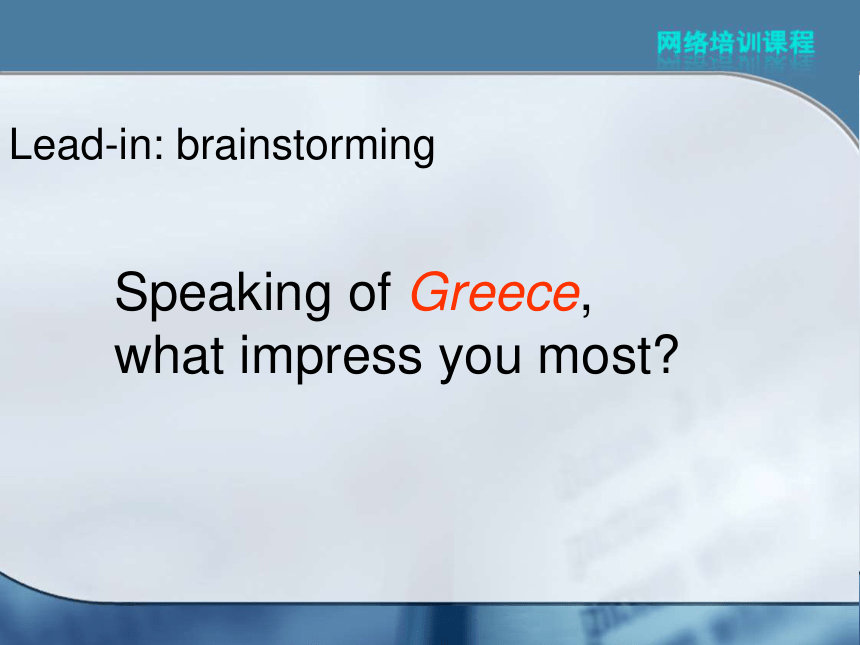
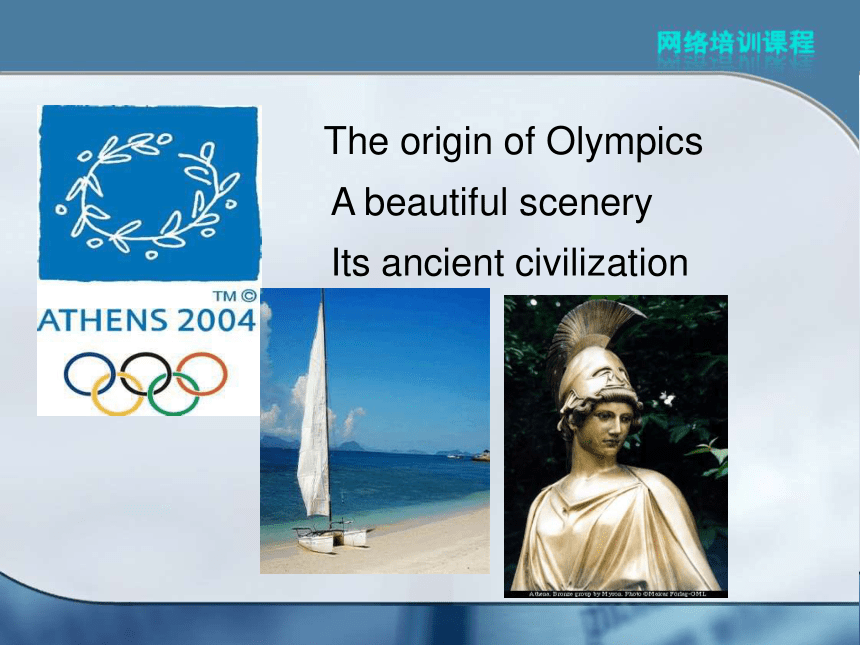
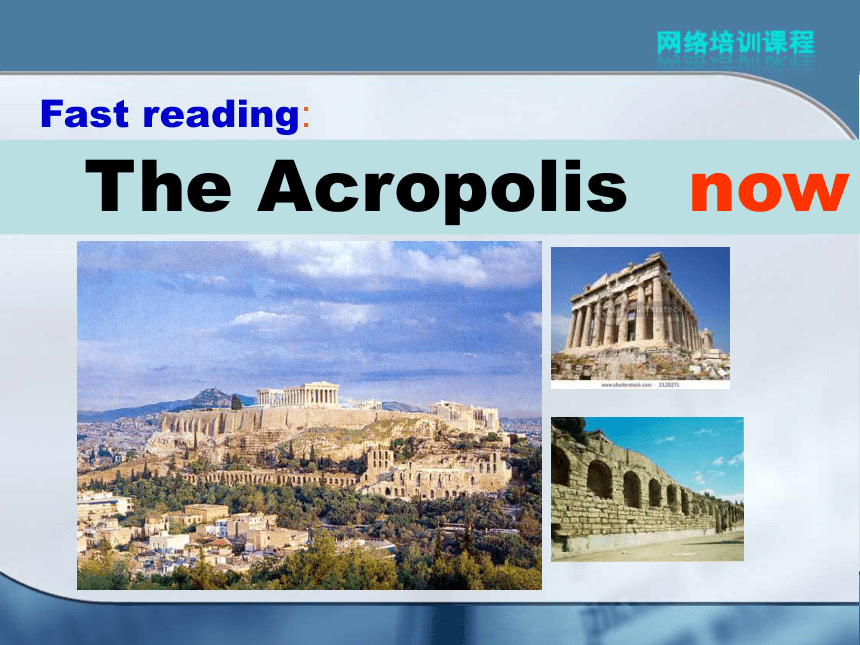
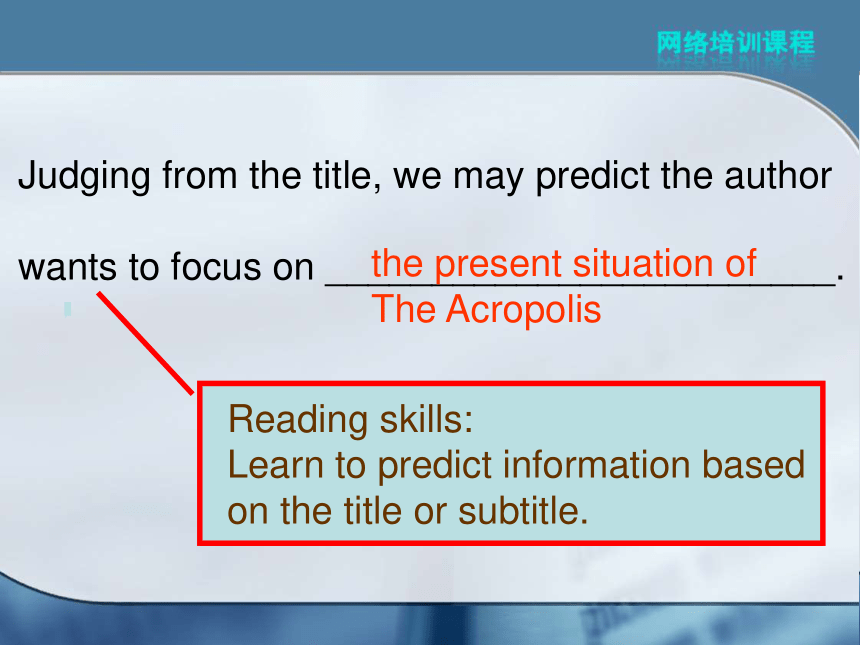
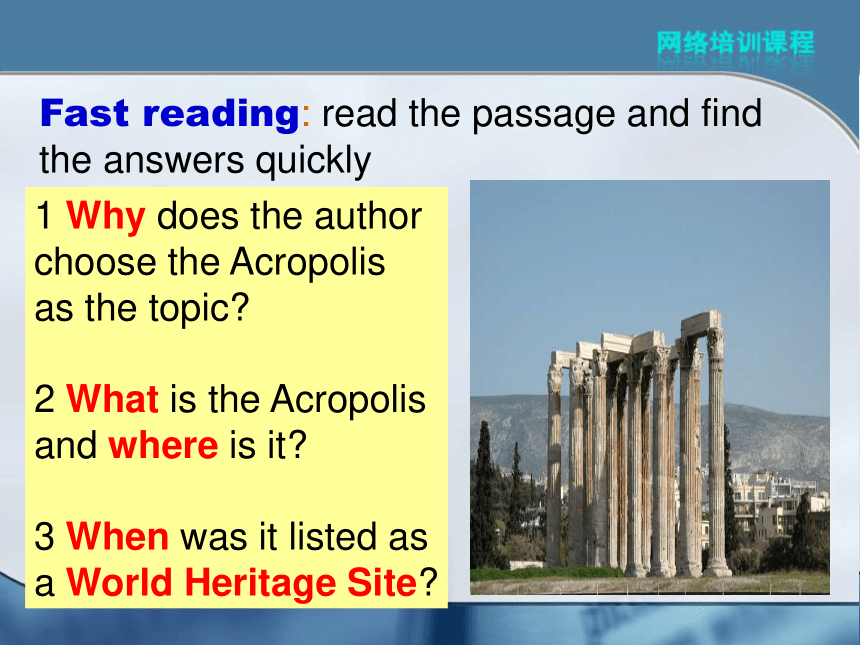
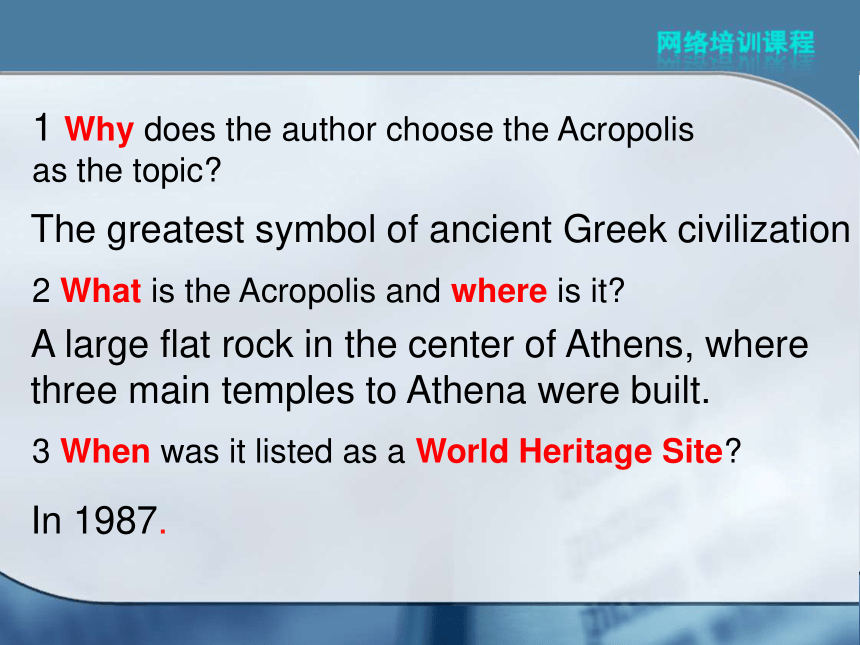
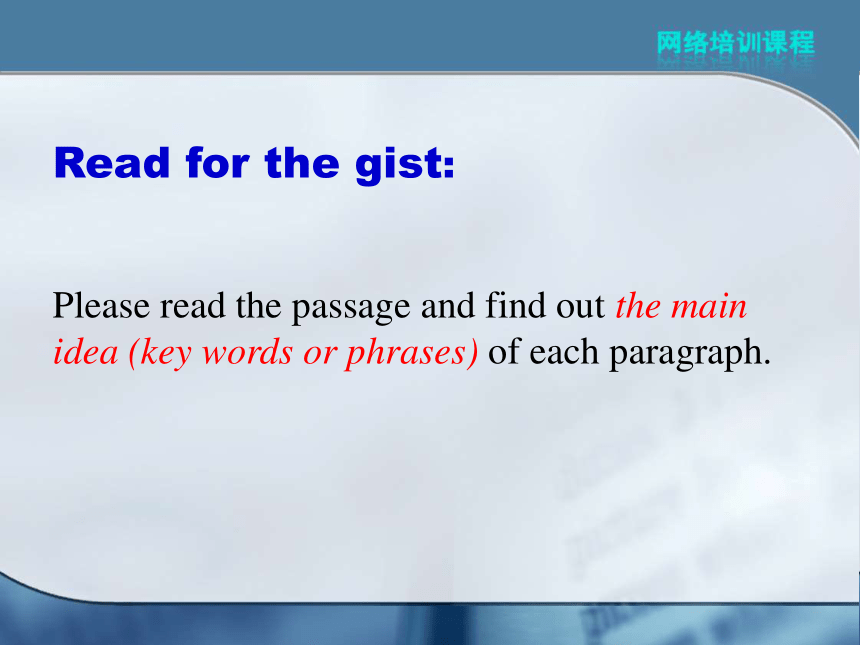

文档简介
课件27张PPT。The Acropolis NowM9U2 Reading (I)Speaking of Greece,
what impress you most?Lead-in: brainstormingThe origin of OlympicsA beautiful sceneryIts ancient civilizationHow about the author?The AcropolisnowFast reading:Judging from the title, we may predict the author
wants to focus on ________________________.the present situation of
The AcropolisReading skills:
Learn to predict information based on the title or subtitle.Fast reading: read the passage and find the answers quickly1 Why does the author
choose the Acropolis
as the topic?
2 What is the Acropolis
and where is it?
3 When was it listed as
a World Heritage Site?1 Why does the author choose the Acropolis
as the topic?
2 What is the Acropolis and where is it?
3 When was it listed as a World Heritage Site?The greatest symbol of ancient Greek civilizationA large flat rock in the center of Athens, where
three main temples to Athena were built.In 1987.Read for the gist:
Please read the passage and find out the main idea (key words or phrases) of each paragraph.Read for the gist :Para.2 Para.1 Para.3 Para.4 Para.5 Para.6 Para.7 The influence or importance of the
ancient Greek civilizationIts brief introduction and the temples built on itThe damage caused The damage causedA committee founded and much progress madeEfforts of the committee to preserve itEfforts of the committee to preserve itPart onePart twoPart threePart fourbefore 1830after1830Read for the gist:
Can you draw up the outline of the passage?The topicPart one:
Part two:
Part three:
Part four:Read for the gist:The AcropolisThe influence of The ancient civilization A brief introduction and the temples built on itThe damage caused to itEfforts to preserve itThe topicPart one:
Part two:
Part three:
Part four:The Acropolis nowThe importance of the ancient Greek civilization A brief introduction and the temples built on itThe damage caused to itEfforts to preserve itThink : Can we delete the first part since it seems to
have nothing to do with the Acropolis??Detailed reading: Part three
Please read Para. 3 and answer the following question:
Para. 3 is developed by ______?
A the order of time.
B presenting examples
C the order of importance
D analyzing cause and effectsDetailed Reading: Part three
Please read Part three and list the damages according to the order of time.Damage caused by humanBefore the independenceIn 1458, Italy,
explosionIn 1687, TurksFor centuries…In 1801, Lord Elgin
the Englishman
Damage caused by man mainly lies in __________ and
_________.wartheftDetailed reading: Part three
Please read Para. 4 and answer the following question:
Damage caused by humanAfter the independencecausesexamplesUnsuccessful
repair worktourismpollutionSimply walking around;
Caused deliberatelySmog and acid rainIn-depth reading:
What’s the author’s attitude towards the damage in para.4?
A objective
B doubtful
C negative
D regretful
Unfortunately ….so clumsy that…simply walking
…deliberately…Natural forcesEarthquakes and plant rootsHuman damageWar theftUnsuccessful
repair worktourismpollutionSimply walking around; caused deliberatelySmog and acid rainHow to solve these problems according to you?Detailed reading: Part four
Please read Part four and find out the solutions given by the author.Natural forcesEarthquakes and plant rootsHuman damageWar theftUnsuccessful
repair worktourismpollutionSimply walking around; caused deliberatelySmog and acid rainHow to solve these problems according to the author?Solutions Ask for return To be mendedTo be mendedTo educate peopleA steady cleaning programmeTo store them insideWhich of the solutions is the most effective
according to you? And why?Think: What else do you think should be done? In-depth reading:
Read between lines
1 This has caused some friction between
Greece and Britain, as the Greek government
has never given up asking for the return of
these marble statues.In-depth reading:
Read between lines
1 He later sold them to the British government.
2 In fact, repairs were so clumsy that they made
some of the buildings less secure than they
had been before.Reading skills:
Learn to predict the meaning of a word or what a reference marker refers to based on the context.In-depth reading:
Read beyond lines
The Acropolis is history and is there anything to do with “now” or “future”?
Is there anything we can do to preserve history? History Present ?Future Let's appreciate your presentation!Thank you!
what impress you most?Lead-in: brainstormingThe origin of OlympicsA beautiful sceneryIts ancient civilizationHow about the author?The AcropolisnowFast reading:Judging from the title, we may predict the author
wants to focus on ________________________.the present situation of
The AcropolisReading skills:
Learn to predict information based on the title or subtitle.Fast reading: read the passage and find the answers quickly1 Why does the author
choose the Acropolis
as the topic?
2 What is the Acropolis
and where is it?
3 When was it listed as
a World Heritage Site?1 Why does the author choose the Acropolis
as the topic?
2 What is the Acropolis and where is it?
3 When was it listed as a World Heritage Site?The greatest symbol of ancient Greek civilizationA large flat rock in the center of Athens, where
three main temples to Athena were built.In 1987.Read for the gist:
Please read the passage and find out the main idea (key words or phrases) of each paragraph.Read for the gist :Para.2 Para.1 Para.3 Para.4 Para.5 Para.6 Para.7 The influence or importance of the
ancient Greek civilizationIts brief introduction and the temples built on itThe damage caused The damage causedA committee founded and much progress madeEfforts of the committee to preserve itEfforts of the committee to preserve itPart onePart twoPart threePart fourbefore 1830after1830Read for the gist:
Can you draw up the outline of the passage?The topicPart one:
Part two:
Part three:
Part four:Read for the gist:The AcropolisThe influence of The ancient civilization A brief introduction and the temples built on itThe damage caused to itEfforts to preserve itThe topicPart one:
Part two:
Part three:
Part four:The Acropolis nowThe importance of the ancient Greek civilization A brief introduction and the temples built on itThe damage caused to itEfforts to preserve itThink : Can we delete the first part since it seems to
have nothing to do with the Acropolis??Detailed reading: Part three
Please read Para. 3 and answer the following question:
Para. 3 is developed by ______?
A the order of time.
B presenting examples
C the order of importance
D analyzing cause and effectsDetailed Reading: Part three
Please read Part three and list the damages according to the order of time.Damage caused by humanBefore the independenceIn 1458, Italy,
explosionIn 1687, TurksFor centuries…In 1801, Lord Elgin
the Englishman
Damage caused by man mainly lies in __________ and
_________.wartheftDetailed reading: Part three
Please read Para. 4 and answer the following question:
Damage caused by humanAfter the independencecausesexamplesUnsuccessful
repair worktourismpollutionSimply walking around;
Caused deliberatelySmog and acid rainIn-depth reading:
What’s the author’s attitude towards the damage in para.4?
A objective
B doubtful
C negative
D regretful
Unfortunately ….so clumsy that…simply walking
…deliberately…Natural forcesEarthquakes and plant rootsHuman damageWar theftUnsuccessful
repair worktourismpollutionSimply walking around; caused deliberatelySmog and acid rainHow to solve these problems according to you?Detailed reading: Part four
Please read Part four and find out the solutions given by the author.Natural forcesEarthquakes and plant rootsHuman damageWar theftUnsuccessful
repair worktourismpollutionSimply walking around; caused deliberatelySmog and acid rainHow to solve these problems according to the author?Solutions Ask for return To be mendedTo be mendedTo educate peopleA steady cleaning programmeTo store them insideWhich of the solutions is the most effective
according to you? And why?Think: What else do you think should be done? In-depth reading:
Read between lines
1 This has caused some friction between
Greece and Britain, as the Greek government
has never given up asking for the return of
these marble statues.In-depth reading:
Read between lines
1 He later sold them to the British government.
2 In fact, repairs were so clumsy that they made
some of the buildings less secure than they
had been before.Reading skills:
Learn to predict the meaning of a word or what a reference marker refers to based on the context.In-depth reading:
Read beyond lines
The Acropolis is history and is there anything to do with “now” or “future”?
Is there anything we can do to preserve history? History Present ?Future Let's appreciate your presentation!Thank you!
同课章节目录
- 模块9
- Unit 1 Other countries, other cultures
- Unit 2 Witnessing time
- Unit 3 The meaning of colou
- Unit 4 Behind beliefs
- 模块10
- unit 1 building the future
- unit 2 people on the move
- unit 3 protecting ourselves
- unit 4 law and orde
- 模块11
- unit 1 careers and skills
- unit 2 getting a job
- unit 3 the secret of success
- unit 4 the next step
